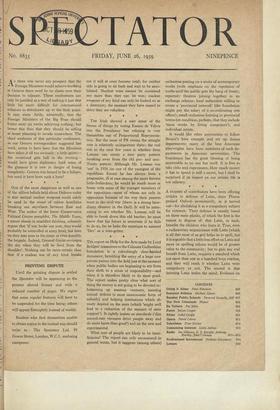THE report on Help for the Arts made by Lord
Bridges' committee to the Calouste Gulbenkian foundation is a refreshingly clear-headed document, heralding the entry of a large new private patron into the field just at the moment when public bodies are beginning to stir from their sloth to a sense of responsibility—and when it is therefore likely to do most good. The report makes pretty clear what sort of thing the money is not going to be devoted to : bolstering up amateur ventures, meeting annual deficits (a most uneconomic form of subsidy) and helping institutions which al- ready depend on the state (which 'might well lead to a reduction of the amount of state support'). It rightly insists on standards ('dim second-rate ventures drive people away and do more harm than good') and on the new and experimental.
What sort of people are likely to be bene- ficiaries? The report can only recommend in general terms, but it suggests (among others) orchestras putting on a series of contemporary works (with emphasis on the repetition of works until the public gets the hang of them); repertory theatres joining together in an exchange scheme; local authorities willing to create a 'provincial network' (the foundation might pay the salary of a co-ordinating arts officer); small orchestras forming in provincial towns (on condition, perhaps, that they include 'more works by living composers'); and individual artists.
It would like other universities to follow Bristol's lone example and set up drama departments; many of the best American playwrights have been members of such de- partments in American universities. The foundation has the great blessing of being answerable to no one but itself. It is free to take risks and experiment. How much money it has to spend is still a secret, but I shall be surprised if its impact on our artistic life is not salutary.


















